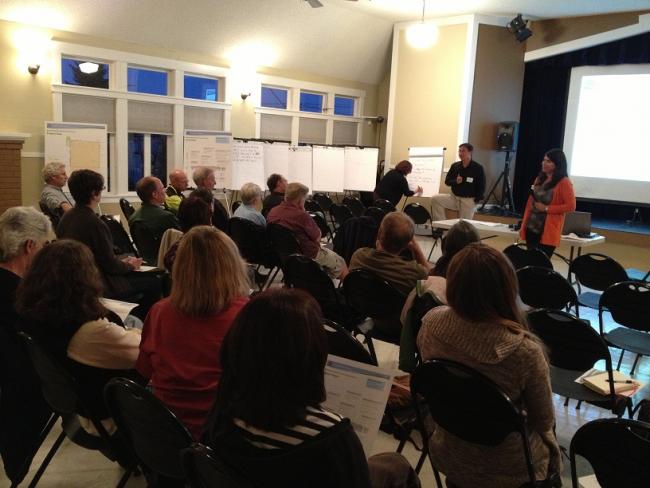Cautious support for phase two of rain garden program
Andrew Lee from Seattle Public Utilities speaks in front of an audience at the Sunset Hill Community Club about re-initiating the roadside rain garden program.
Thu, 10/04/2012
By Val Gilmore, UW News Lab
Andrew Lee, manager of Seattle Public Utilities, told a public meeting Tuesday night that his agency did not involve the community enough in last year’s rain-garden project. “Shame on us,” Lee said. “We were in a phase where we weren’t listening as much as we should have. We are listening now.”
About 40 local residents attended the meeting at the Sunset Hill Community Club. Lee presented phase two of a plan to combat the failed pilot program that was launched last year, which had installed 10 blocks of roadside rain gardens. When many of the gardens flooded over, the project had to be scrapped.
Now SPU is taking a new approach that he described as far more transparent and involving the community. “It is safe to say we won’t do a project that way again. We have done a lot of thinking and know what we need to do this time,” he said.
The discussion revolved around how Seattle Public Utilities plans to combat combined sewer overflows (CSO) by learning from the mistakes of the initial plan.
This attempt to re-initiate the rain-garden program in Ballard has been revamped, according to Lee, to prevent the flooding many residents experienced last year. Phase two of The Ballard Roadside Raingardens Project is part of a program to prevent sever overflows into Salmon Bay.
Kim McDonald, a Ballard resident who volunteered as a Technical Advisor during the initial phase of installation, favors the project but remains skeptical that this time will be different. “They are putting on a good show. Let’s see what happens,” she said.
Others echoed McDonald’s skepticism. Lee assured the audience that the re-initiation plan will have a strong emphasis on community involvement.
Nancy Ahern, deputy director of Seattle Public Utilities, expressed her anticipation for the re-initiation. “We learned two very important lessons from our first attempt — to do our technical homework and partner with the community. We will gain support as long as we are doing these two things,” she said.
After Lee finished his presentation, audience members asked about the realistic projection of success, how SPU would include the community more than in the first phase, and where the rain gardens would be located. One resident explicitly asked what the goals of the project were, prompting hard evidence and a strong reaction from Lee. Lee confirmed that his goal is to build 20 blocks of rain gardens with the ability to divert up to 100,000 gallons of water a year, doubling the initial goals of phase one. “I’ll be frank. We are looking for a high degree of success this time,” he said.
Following this segment, attendees gathered in a circle for a more intimate conversation. The atmosphere was relaxed and open. McDonald said she sensed an increased level of support this year from last. “This is comforting to see,” she said.
But not everyone was optimistic. One local, wishing to remain anonymous, simply stated, “You don’t want my opinion” when asked if she supported the re-initiation.
Mike Declue, who lives on 28th Ave NW, a notoriously traffic-heavy street in Ballard, expressed general support despite a fear of long-term damage. “I am in favor [of the re-initiation because it has the potential to help calm traffic and clean the [Puget, but my patio already slopes. Will it get worse? I can’t tell,” he said.


